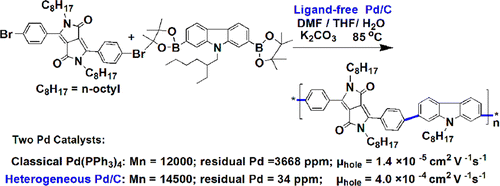Shi-Yong Liu, Han-Ying Li*, Min-Min Shi, Hao Jiang, Xiao-Lian Hu, Wang-Qiu Li, Lei Fu, Hong-Zheng Chen* , Macromolecules 2012, 45, 9004-9009.
http://pubs.acs.org/doi/full/10.1021/ma3019238
Conjugated polymers are the primary blocks for organic electronics. Traditionally, conjugated polymers synthesized via Suzuki, Heck, and Stille couplings are catalyzed by soluble homogeneous ligated palladiums, which suffer the contaminations of residual nano-palladium and phosphine impurity resulting from side reaction of aryl–aryl exchange. To overcome these drawbacks, a commercially available, clean, and ligand-free heterogeneous catalyst Pd/C for the C–C coupling polymerizations was developed in this work. The Pd/C catalyst showed increases in catalytic activity for Suzuki and Heck polymerizations, as compared with the classical homogeneous catalyst Pd(PPh3)4. Furthermore, the Pd/C catalyst exhibited advantage of much less Pd residue in the resulting polymers, leading to better charge transport properties as demonstrated by field effect transistors.

|
